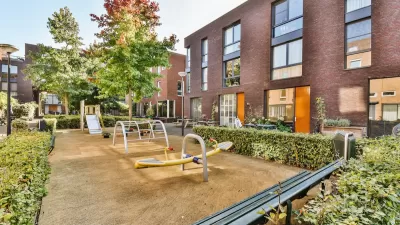For households looking for three bedrooms or more, finding rental units in walkable places is harder than ever.

“As former warehouse districts become playgrounds for college grads rather than toddlers and yesterday's streetcar suburbs become today's targets for institutional investors' portfolios, families searching for an affordable, three-bedroom apartment accessible to public transit have found them nearly impossible to find,” write Barry Greene Jr. in Streetsblog USA.
In part, this is because “Developers typically receive less money for square footage when building three-bedroom units.” But Greene also attributes this change to cultural factors. “Increasingly, we've noticed in our own area that families with young children are being erased from the marketing of new urban residential developments, which offer amenities like dog parks, pet washing stations and even ‘listening rooms’ for music lovers rather than playgrounds or kid-friendly pools.”
This doesn’t only apply to the parents of young children. “ I share this sentiment with families taking in aging parents for care, families who chose multigenerational living for their children, and families who rely on remote or hybrid work,” Greene adds.
Greene sees several policy levers that cities could use to support more family-oriented housing. “For starters, at the absolute minimum, cities should enact zoning reforms to make three-bedroom apartments legal to build in walkable, transit-oriented areas.” Greene also suggests development incentives such as tax abatements to combat what he sees as “a frightening trend” that pushes families and children away from vibrant urban neighborhoods.
FULL STORY: Where Have All the Three-Bedrooms in Walkable Neighborhoods Gone?

Alabama: Trump Terminates Settlements for Black Communities Harmed By Raw Sewage
Trump deemed the landmark civil rights agreement “illegal DEI and environmental justice policy.”

Study: Maui’s Plan to Convert Vacation Rentals to Long-Term Housing Could Cause Nearly $1 Billion Economic Loss
The plan would reduce visitor accommodation by 25% resulting in 1,900 jobs lost.

Planetizen Federal Action Tracker
A weekly monitor of how Trump’s orders and actions are impacting planners and planning in America.

Waymo Gets Permission to Map SF’s Market Street
If allowed to operate on the traffic-restricted street, Waymo’s autonomous taxis would have a leg up over ride-hailing competitors — and counter the city’s efforts to grow bike and pedestrian on the thoroughfare.

Parklet Symposium Highlights the Success of Shared Spaces
Parklets got a boost during the Covid-19 pandemic, when the concept was translated to outdoor dining programs that offered restaurants a lifeline during the shutdown.

Federal Homelessness Agency Places Entire Staff on Leave
The U.S. Interagency Council on Homelessness is the only federal agency dedicated to preventing and ending homelessness.
Urban Design for Planners 1: Software Tools
This six-course series explores essential urban design concepts using open source software and equips planners with the tools they need to participate fully in the urban design process.
Planning for Universal Design
Learn the tools for implementing Universal Design in planning regulations.
Caltrans
Smith Gee Studio
Institute for Housing and Urban Development Studies (IHS)
City of Grandview
Harvard GSD Executive Education
Toledo-Lucas County Plan Commissions
Salt Lake City
NYU Wagner Graduate School of Public Service





























